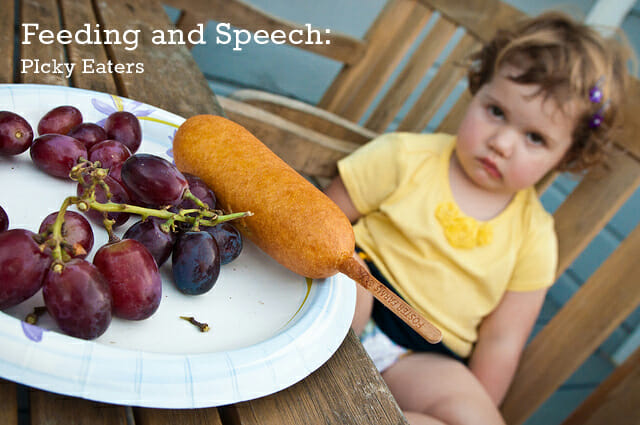This summer, we’re publishing a series of blog posts with a focus on issues related to feeding – how to know what’s normal for your infant and toddler or when to seek help. This week’s installment focuses on picky eaters. Our earlier covered bottle and breast feeding troubles, reflux and spoon feeding, and pacifiers and sippy cups.
Feeding a child who has difficulty accepting new foods can be extremely stressful for both the parent and the child. If you’re stressed out by your child’s limited diet or refusal to try new foods, help is available! While behavior can be a factor with some of our “picky” eaters, there are oral motor, sensory, and psychological components that can impact both a child and parent’s perspectives toward food.
10 Quick Questions to Consider About Picky Eaters
- Does your child eat from a variety of food groups or only eat specific foods, brands, etc.?
- Does your child avoid/refuse specific food groups and/or foods, flavors, textures, colors, etc?
- Does your child push away their plate, look away, and/or try to remove themselves from the table when non-preferred foods are presented?
- Does your child gag frequently on new/non-preferred foods?
- Is your child coughing throughout meals and/or drinks? Have watery eyes? Gurgling speech after meals? Frequent upper respiratory infections?
- Does your child take a long time to chew his food?
- Is food consistently falling out of her mouth?
- Does your child put his fingers in his mouth while eating?
- Does your child overstuff her mouth?
- Do you find leftover food in your child’s mouth outside of meal time?
Picky eating can be caused by medical issues, oral motor difficulties, sensory issues, behavior, or some combination of the above. For more information on the causes of picky eating, check out our recent blog post on the subject. The good news is that even though these issues can be serious, ALL of these symptoms can be improved with intervention, and the earlier the better.
Feeding issues and speech delays go hand-in-hand and can begin to “chip away” at life skills, so it’s important to address any problems early on. If you feel your child’s picky eating could be caused by an underlying issue that should be addressed, consider talking to a licensed speech pathologist/feeding specialist. Many of our speech therapists at Kid’s Creek Therapy are trained in the Sequential Oral Sensory (S.O.S.) Approach, which is geared specifically toward picky eaters and problem feeders. If you or someone you know would like to learn more about how we can help your child, contact us for a free consultation.
Jessica Orlick, MS, CCC-SLP
Photo Courtesy of David Goehring/flickr. Title banner added.








